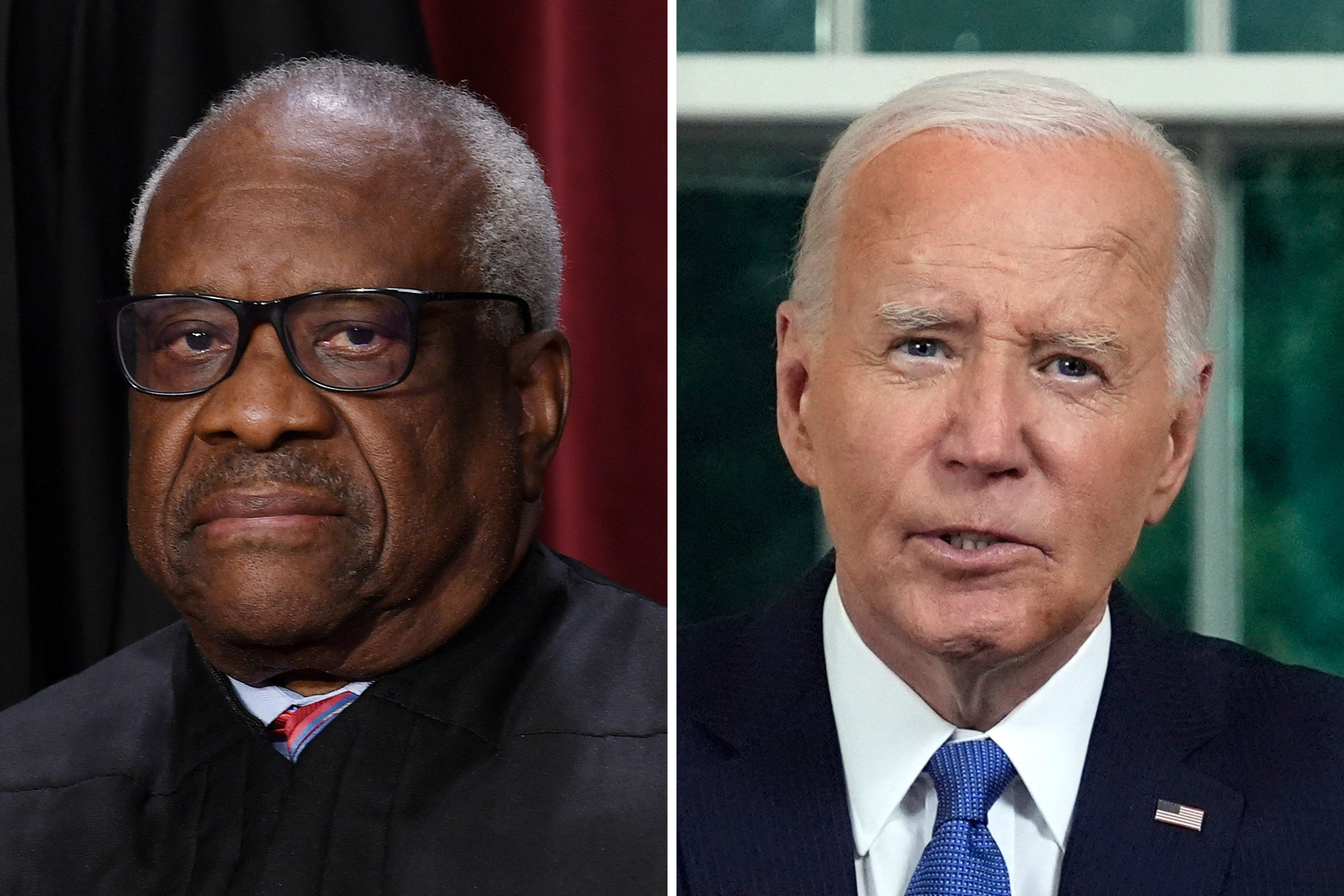President Joe Biden is putting a spotlight on Justice Clarence Thomas amid ongoing concerns regarding ethics in the Supreme Court.
On Monday, Biden unveiled a new initiative aimed at “restoring trust and accountability” in the judicial system. This announcement comes as public perception of the Supreme Court hovers around some of its lowest levels in history. The reform plan suggests three primary changes, including a mandatory and enforceable code of conduct for the justices.
According to a fact sheet released by the White House, this proposed code would mandate justices to “disclose gifts, avoid engaging in public political activities, and recuse themselves from cases that involve financial conflicts of interest for themselves or their spouses.”
Two specific elements of the code seem to directly target Thomas, who is often seen as the most contentious member of the Supreme Court.
In recent years, the conservative justice has encountered significant criticism after it came to light that he failed to appropriately report travel and gifts received from affluent Republican donors who have interests in cases before the court.
Thomas has also been scrutinized for his reluctance to recuse himself from cases that critics claim present a conflict of interest, particularly in light of his wife Ginni Thomas’ political endeavors.
Ginni Thomas is known as a right-wing activist and was involved in efforts led by the GOP to challenge the results of the 2020 election. Messages released to the House January 6 Committee reveal her urging Mark Meadows, former White House Chief of Staff, to overturn Donald Trump’s electoral loss, describing it as “the greatest Heist of our History.”

Calls for Thomas to recuse himself have been rampant, and articles of impeachment have even been proposed against him.
Representative Alexandria Ocasio-Cortez, a Democratic member of Congress, introduced an impeachment resolution against both Thomas and Justice Samuel Alito earlier this month. She argued that their undisclosed gifts and refusal to step aside in certain situations “would constitute a severe breach that could lead to removal in any lower court, disqualifying any appointee for the Supreme Court from confirmation.”
Additionally, Ocasio-Cortez and Representative Jamie Raskin recently introduced the High Court Gift Ban Act, which seeks to restrict justices from accepting gifts worth over $50 individually or more than $100 in total during a year. Furthermore, it would limit personal hospitality gifts, which currently lack regulations, to roughly $18,000—reflecting the tax-exempt threshold for personal gifts.
“The Supreme Court stands as the highest judicial authority in the country but has some of the weakest ethical standards, allowing wealthy donors and special interest groups to essentially buy justice,” Raskin remarked in a statement.
Unlike other federal judicial positions, Supreme Court justices remain the only ones without an enforceable ethics code. While the court did adopt a code mimicking those for lower court judges in November, its implementation is nearly non-existent, with no specific penalties set for violations. All nine sitting justices have endorsed this code, but adherence is left entirely to individual discretion.
This new ethics framework is the court’s first tentative step to address ongoing critiques regarding the lack of enforceable ethical guidelines within the Supreme Court. The absence of such measures, coupled with several contentious rulings in recent times, has significantly undermined public confidence.
A Gallup poll from 2023 revealed that only 41 percent of American adults approve of the Supreme Court’s performance, indicating that the institution has struggled to regain footing after reaching a record low approval rating of 40 percent in September 2021. This decline followed the court’s refusal to block a controversial Texas abortion statute, paving the way for its 2022 decision to overturn Roe v. Wade. Prior to this low point, the court enjoyed a 58 percent approval rating in July 2020.
According to the White House, “Recent ethics scandals involving certain justices have led the public to question the impartiality and independence crucial for the Court to fulfill its duty of delivering justice for all Americans.”
Additionally, Biden is advocating for an amendment to the Constitution to negate the Supreme Court’s immunity ruling from earlier this month and to establish term limits for justices. In a 6-3 ruling in Trump v. United States, the court decided that a president retains immunity from prosecution when executing presidential duties. The position of a Supreme Court justice, however, is a lifetime appointment.
